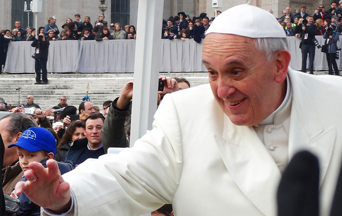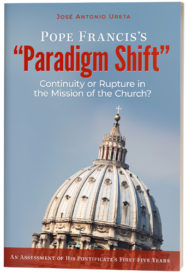
In his book, Pope Francis’s “Paradigm Shift”: Continuity or Rupture in the Mission of the Church?, Mr. José Antonio Ureta spells out many reasons for faithful Catholics to be concerned about the direction in which Pope Francis is taking the Church. Chapter six discusses the Pope’s inclination to reject objective morality and replace it with moral relativism. In this excerpt, the famous question, “Who am I to judge?” is discussed:
✧ † ✧
Pope Francis confirms this moral relativism through highly symbolic gestures. The first was his response to a journalist’s question on the return flight from Rio de Janeiro, after the World Youth Day. It has become a kind of motto of his pontificate. The journalist mentioned widely documented homosexual moral scandals in Montevideo, Uruguay involving Msgr. Battista Ricca, a close collaborator of the pope, and asked how the pope intended to:
confront the whole question of the gay lobby?…
When Non-Negotiable Values Are Neglected
[The pope replied:] I see that many times in the Church, over and above this case, but including this case, people search for “sins from youth,” for example, and then publish them…. But if a person, whether it be a lay person, a priest or a religious sister, commits a sin and then converts, the Lord forgives, and when the Lord forgives, the Lord forgets…. So much is written about the gay lobby. I still haven’t found anyone with an identity card in the Vatican with “gay” on it. They say there are some there…. If someone is gay and is searching for the Lord and has good will, then who am I to judge him?1

Order PRINT copy.
10 Razones Por las Cuales el “Matrimonio” Homosexual
es Dañino y tiene que Ser Desaprobado
By shifting from the issue of sinful homosexual relations, at the heart of the question, to the homosexual tendency, which can be involuntary, the pope seemed to imply in his imprecise language that he judges neither same-sex attracted people nor those who engage in homosexual relations. That was how the media interpreted the phrase “who am I to judge?” and trumpeted it to the four corners of the world. This received no subsequent papal rectification. In several cases, both Catholic legislators and voting citizens approved bills and ballot measures favoring the legalization of homosexual unions. When doing so, they rationalized their actions claiming that they could not be “more papist than the pope.”2
* * *
José Antonio Ureta’s book is a startling and disturbing assessment that should be read by every person who is concerned about the changes that Pope Francis is trying to force upon the Church. Purchase the book through the TFP Store or download it at no charge by using the link below.
Purchase the book, Pope Francis’s “Paradigm Shift” here
Free Download Pope Francis’s “Paradigm Shift” here
Footnotes
- Francis, “Press Conference of Pope Francis During the Return Flight: Apostolic Journey to Rio de Janeiro on the Occasion of the XXVIII World Youth Day,” Jul. 28, 2013, http://w2.vatican.va/content/francesco/en/speeches/2013/july/documents/papa-francesco_20130728_gmg-conferenza-stampa.html.
- Lisa Bourne, “Pope Francis: Don’t Be ‘More Papist Than the Pope,” LifeSiteNews, Apr. 28, 2017, https://www.lifesitenews.com/news/francis-blasts-critics-for-defending-catholic-teaching-dont-be-more-papist.
